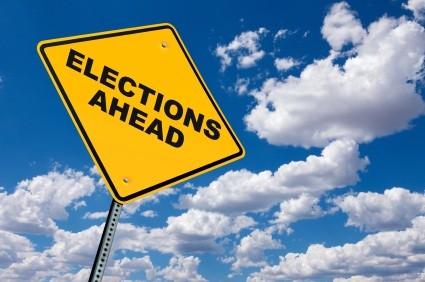I feel a subtle, renewed vigor during this transition of seasons as the thick heat of summer makes way for crisper air. Autumn is my favorite season. It may be because I am approaching the moment of my solar return, preparing to be reborn after an arduous journey around the sun.
The transition also portends an event in another cycle; what we, in this nation state, in a small part of the Northern Hemisphere of the planet we call Earth, in a solar system quite distant from the center of the Milky Way galaxy, call The Election. We call the nation state the United States, which conveniently abbreviates to US, which we call ourselves, that is, "us." The strangeness of this, of course, extends to requiring all the other human beings breeding like a mass of bacterium on the surface of this ill-fated planet existing within the artificial and arbitrary borders of other nation states, and who might otherwise be referred to as "them," to refer to us as US as well.
This civic event called The Election is not accompanied by any cosmic or celestial activity as are many mostly religious holidays like, say, Christmas, which marks the moment after the solstice when the sun (or son) begins shedding more light resulting in longer days. No, The Election is an artificial, constructed occasion. Not only in its lack of connection to an objectively occurring cosmic cycle, but also in the many-times proven disparity between The Election's actual function and its ostensible purpose: namely, the citizens of US selecting by popular vote a leader for the executive branch of their government.
During this season we all—all of us—can't help having The Election in mind, so thoroughly is it broadcast in all its pornographic banality like a Miley Cyrus halftime show or an execution-style police shooting in some inner city. Indeed, the action and results of the event seem to us and US to be significant. As it was in my mind as well while I walked along a side street in my hometown on one of the aforementioned bright, cool, sunny days (which day reminded me in fact of a particularly delicious apple farmers grow on this part of the planet, called Honey Crisp) that my attention was caught by the title of a worn paperback in the window of a used book shop. The title was How to Spot a Fraud.
I'm a sucker for how-to books. I always want them, and often buy them, because I love the prospect of knowing the means of actualizing things. This is not to say I often read the how-to books I buy, and even less often do I put the instructions they contain into practice, but I feel a certain comfort in knowing I have on my shelf such titles as How to Disappear Completely and Never Be Found, The Complete Guide to Safecracking, and How to Start Your Own Country. So when I saw the book in the window, even as I was thinking about The Election on a delicious, cusp-of-autumn day, I had to have a look.
The introduction, I found, was not incongruent with the title, and in fact went quickly to the heart of the matter. I feel impelled to reproduce some paragraphs from the introduction of this slender tome, because the message is a salient antidote to the malaise of collective quasi-psychosis in the season of The Election:
The truth needs few words, and it always eventually comes to seek expression in action. In action, it reveals itself. Possession of the truth brings certainty. Certainty brings confidence, and confidence clears the way for action.
Fraud, on the other hand, needs to be covered over. Words are a good cover, because they're cheap, and because we all believe in words. We're so used to judging a person by their words that we often neglect to consider what they've actually done. If we catch someone out, they can always excuse themselves with more words. And they will get away with it, until we arrive at that point where we no longer believe in words alone, where we can recognize the truth.
A fraudster knows, even subliminally, what they are. Inside, they know that they're deceiving. They feel a sort of nakedness, but they don't feel shame. Their nakedness can be hidden with excuses for a long, long time, and so frauds become very good at finding the right excuse to conjure the illusion not only that they're not in the wrong, but rather that they are the wronged party. To create the illusion of truth means to create an illusion of certainty, and that means to create confidence based on a lie. This confidence can only result in damaging and dangerous action.
That is why truth is the basis of constructive action, and fraud is the basis of destruction and deterioration, whether in society, in families, in personal relationships, in our hearts, and in our spiritual lives.
How to Spot a Fraud, Joseph Azize, Beech Hill Publishing, 2015













